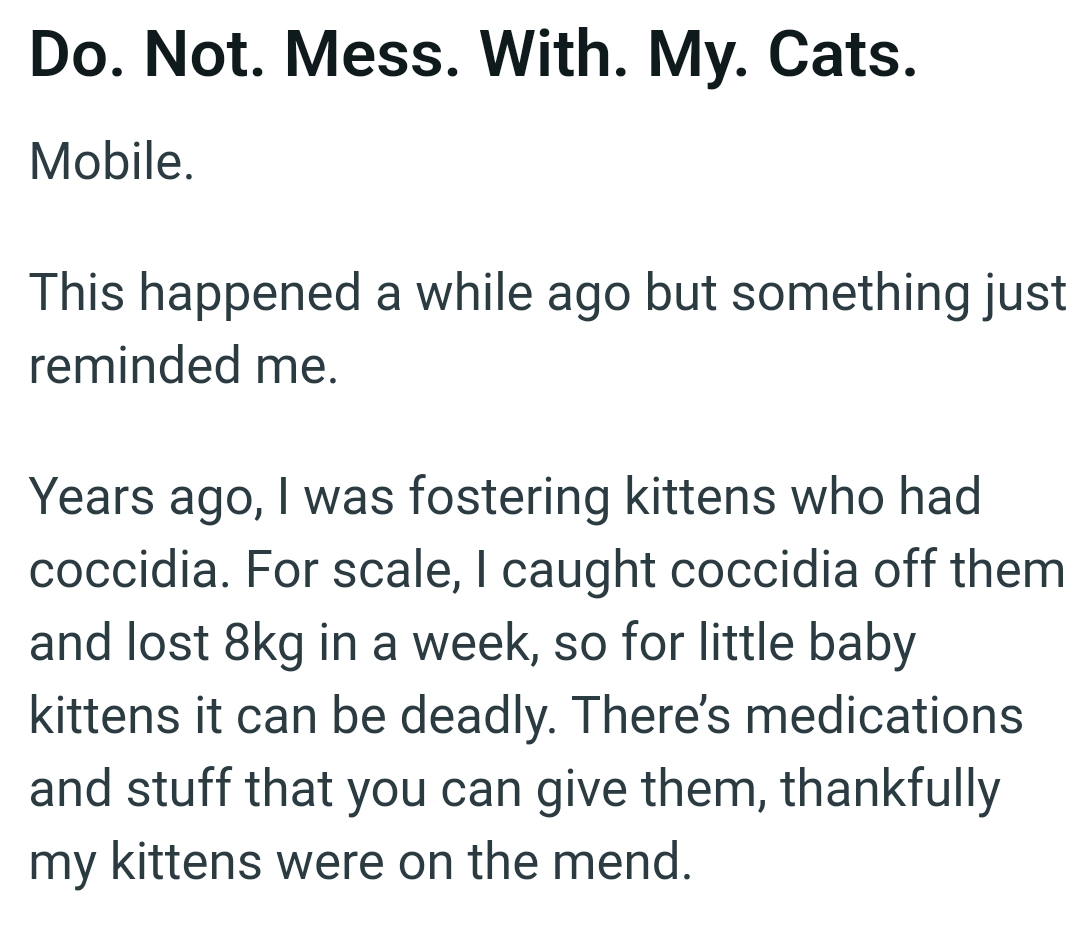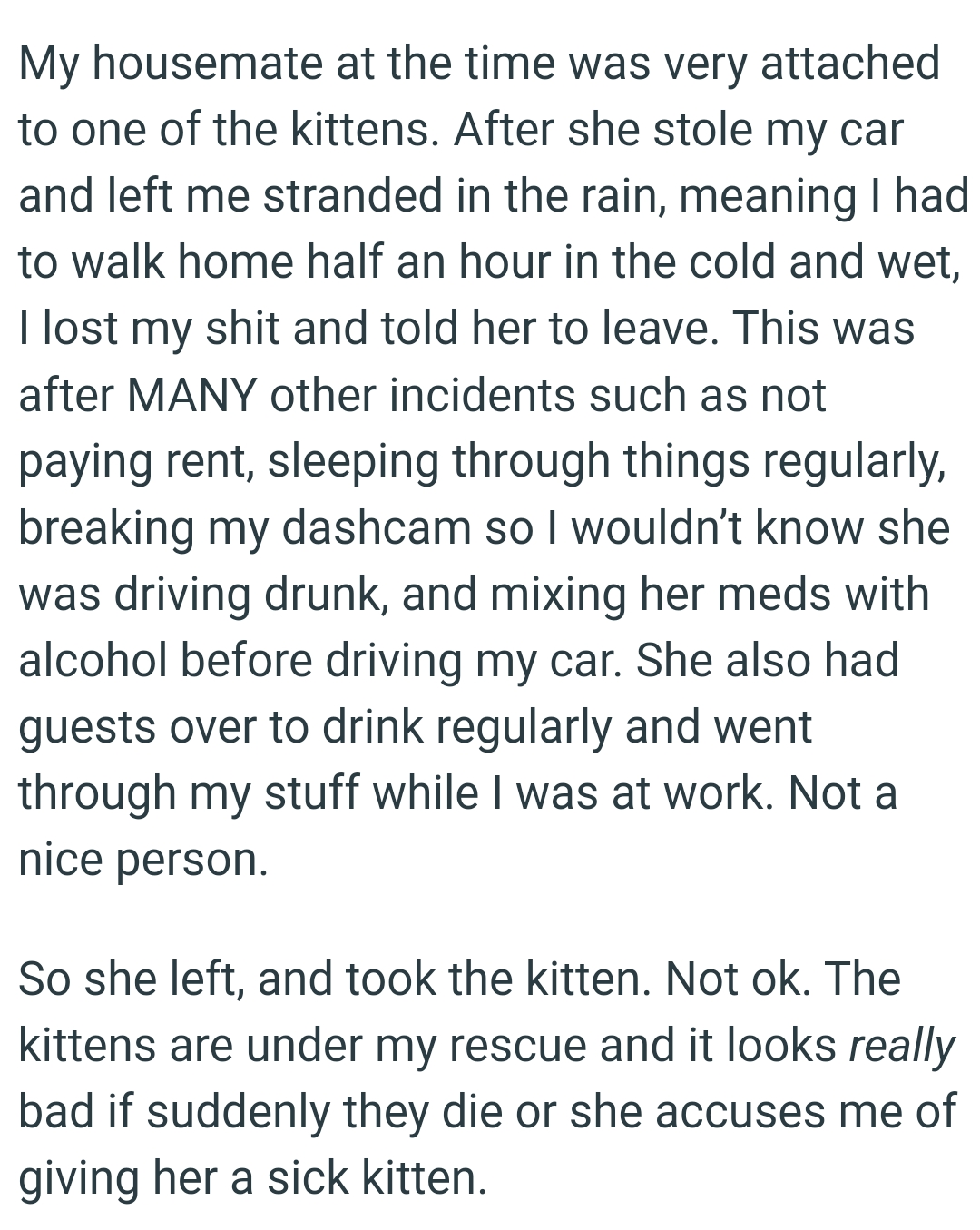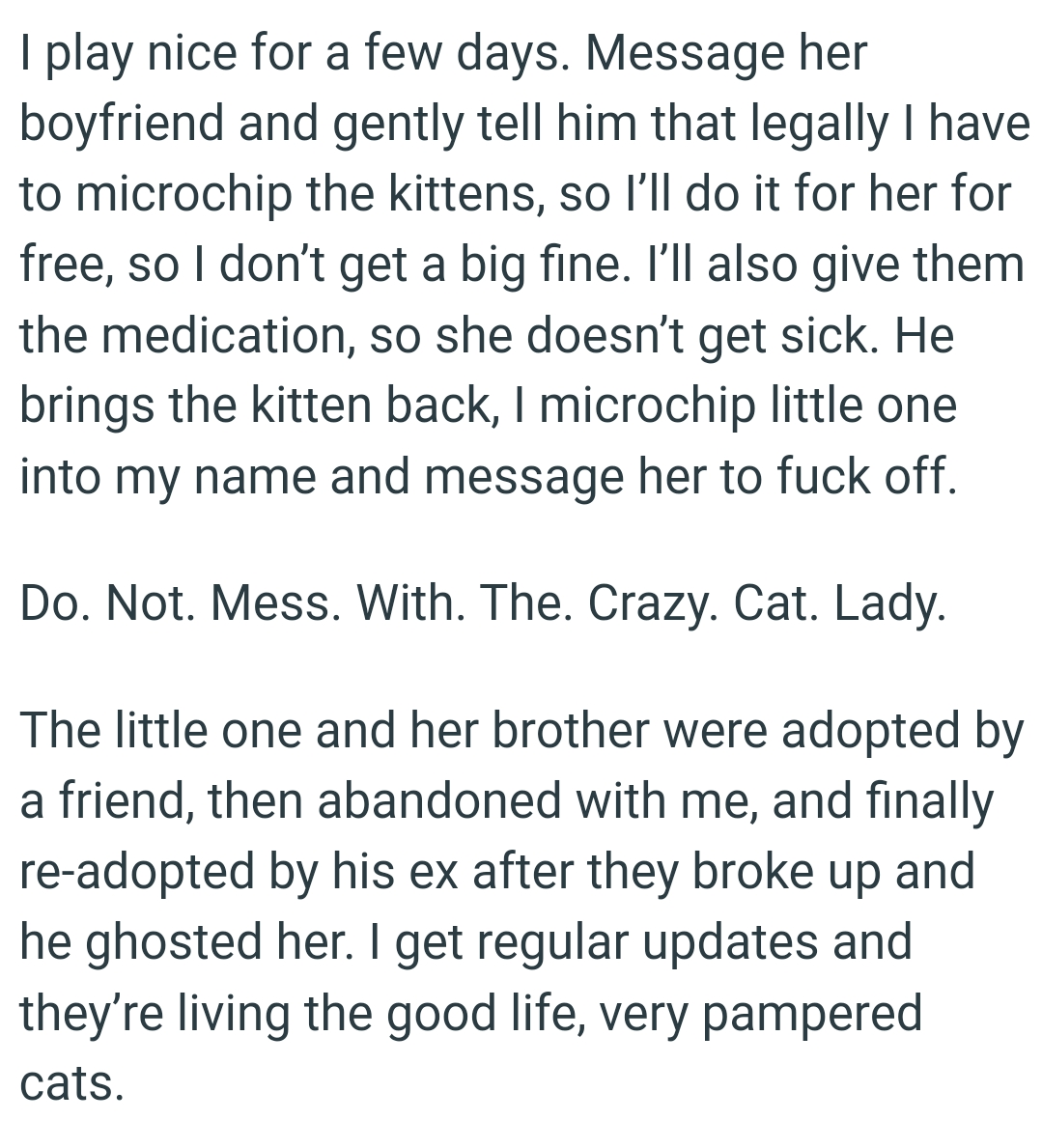Foster Parent Plays Fast One On Ex-Roommate Who Took One Of Her Cats While Moving Out
Until a permanent home is found, dogs and cats who would otherwise be put to death at an overcrowded shelter are temporarily placed with a foster family. As a foster parent, you are never required to do anything!
For any reason, you are free to give your foster pet back to the shelter at any time. All that is required of the foster parent is that they provide food, shelter, and affection to the pet or pets.
If any medical costs arise, they are usually covered by the shelter or rescue organization, or, if you are able, you are free to cover them. Fostering is a fantastic way to discover more about your own requirements as a pet parent, in addition to offering a priceless service to rescue organizations, shelters, and the animals themselves.
And the OP of today's story did just that as she was fostering kittens who had coccidia. OP's housemate at the time was very attached to one of the kittens.
After she stole OP's car and left her stranded in the rain, OP lost her cool and told her to leave. While she was leaving, she took the kitten, which is not appropriate.
The kittens are under OP's rescue, and it looks really bad if suddenly they die or she accuses OP of giving her a sick kitten. Read the full story to find out what happens next.
This story happened a while ago, but something just reminded her, and she decided to share it

OP's roommate had guests over to drink regularly and went through her stuff while she was at work

The Psychology of Attachment and Possession
Dr. Rachel Cohen, an expert in attachment theory, explains that the emotional bonds we form with pets can trigger strong reactions when those bonds are threatened.
In this case, the foster parent's response reflects a deep-seated need for security and control, often rooted in early attachment experiences.
Research shows that when people feel their attachments are threatened, they may react in ways that seem irrational but are deeply tied to their emotional history.
The guy brings the kitten back, and the OP microchipped the little one into her name and messaged her ex-roommate

The OP's actions are very much approved by this crazy cat lady

The Dynamics of Conflict in Shared Living Situations
Living with others can often lead to conflict, especially when personal boundaries are violated. Research in social psychology indicates that boundary violations can trigger feelings of resentment and anger, which may escalate into retaliatory behavior. A classic study on group dynamics highlights how shared living spaces can amplify interpersonal tensions, especially when individuals feel their space or belongings are not respected.
In this case, the former roommate's actions likely felt like a profound betrayal, prompting the foster parent to respond in a way that restored her sense of agency.
This Redditor absolutely loves what the OP did

This Redditor just wants to see the cat being talked about

Every animal rescue that enters a foster home creates room for an animal the rescue would not otherwise be able to take in. It really is that easy.
More animals will be saved when there are more foster homes. Some animal rescues don't even have real places to keep their animals.
They rescue animals from unfavorable circumstances, such as being abandoned, abused, in need of medical attention, or taken from an overcrowded shelter, and they totally depend on foster parents to care for the animals in their homes until they are adopted. Let's head into the comments section and find out what other Redditors have to say regarding the story.
Psychological Analysis
This situation highlights how unresolved emotions can lead to reactive behavior, often causing further conflict. It's important to recognize that feelings of betrayal can stem from deeper issues related to trust and respect in relationships. Addressing these underlying concerns openly can pave the way for more constructive interactions in the future.
Analysis generated by AI
Analysis & Alternative Approaches
Understanding the psychological underpinnings of conflict in shared living situations can lead to healthier resolutions. As emphasized by Dr. Dan Gilbert, a happiness researcher, "Effective conflict resolution hinges on our ability to empathize and communicate openly." By employing these strategies, individuals can build stronger, more respectful relationships in shared spaces, fostering a more harmonious living environment.
Psychological Analysis
This situation illustrates how attachment styles can complicate interpersonal relationships, particularly when emotional investments are at stake.
It's vital to acknowledge that these responses are often rooted in deeper psychological needs for stability and security.
Analysis generated by AI
Analysis & Alternative Approaches
In conclusion, recognizing the emotional significance of pets can lead to healthier communication and conflict resolution strategies.
Fostering empathy toward all parties involved in pet disputes is crucial for maintaining positive relationships.
Additionally, pet ownership is often linked to feelings of companionship and unconditional love, making it even more challenging to cope with loss or disruption.
Studies in the Journal of Animal Psychology indicate that the emotional distress caused by losing a pet can mirror the grief experienced in human relationships, highlighting the depth of these attachments.
Understanding this connection can lead to more compassionate responses as individuals navigate conflicts surrounding pet ownership.
From a psychological perspective, this behavior can be understood through the lens of attachment theory. A secure attachment style fosters healthy relationships and boundaries, while insecure attachment can lead to conflicts over possessions or shared responsibilities. When individuals feel their boundaries are crossed, they may react defensively to protect their sense of self and security.
In this instance, the foster parent’s reaction may reflect an underlying need to assert control in a situation where she felt powerless, highlighting how past relational experiences shape current behaviors.
Taking in a foster cat frees up space for shelters to assist other animals who would otherwise be sent to shelters where they are put to death. Additionally, it provides shelters with a deeper understanding of a cat's personality than we could ever get in a shelter setting, which facilitates the cat's adoption.
The OP is a foster parent and doesn't need someone to make her life any harder. Share this story with your loved ones to get their own opinions as well.
The Role of Emotional Regulation
Effective emotional regulation is crucial in managing interpersonal conflict. As Dr. Esther Perel, a renowned couples therapist, states, "The ability to regulate our emotions allows us to respond to conflict with clarity rather than chaos." Individuals who practice emotional regulation skills are better equipped to handle stressful situations without resorting to vindictive behavior. Techniques such as deep breathing, cognitive reframing, and mindfulness can help individuals respond thoughtfully rather than react impulsively. Encouraging these skills can lead to healthier interactions and reduce the likelihood of conflict escalation, as emphasized by Dr. Alexandra Solomon, a relationship therapist who notes, "When we cultivate emotional awareness, we create space for connection and understanding."
A practical solution for improving communication in shared living situations is implementing conflict resolution strategies. Establishing ground rules for household behavior can create a sense of accountability and promote mutual respect. Conflict resolution training, often provided in therapeutic settings, can equip individuals with the tools to navigate disagreements constructively.
Additionally, engaging in regular check-ins about boundaries and expectations can foster a more harmonious living environment.
Forgiveness as a Healing Tool
Forgiveness can be a powerful tool in resolving conflict and moving past grievances. Studies in psychology suggest that individuals who practice forgiveness experience lower levels of anxiety and depression, as well as improved relationship satisfaction. Engaging in forgiveness does not mean condoning harmful behavior; rather, it allows individuals to release the emotional burden tied to the conflict.
In this case, the foster parent might benefit from reflecting on the importance of forgiveness—not just for her ex-roommate, but for her own emotional well-being.



